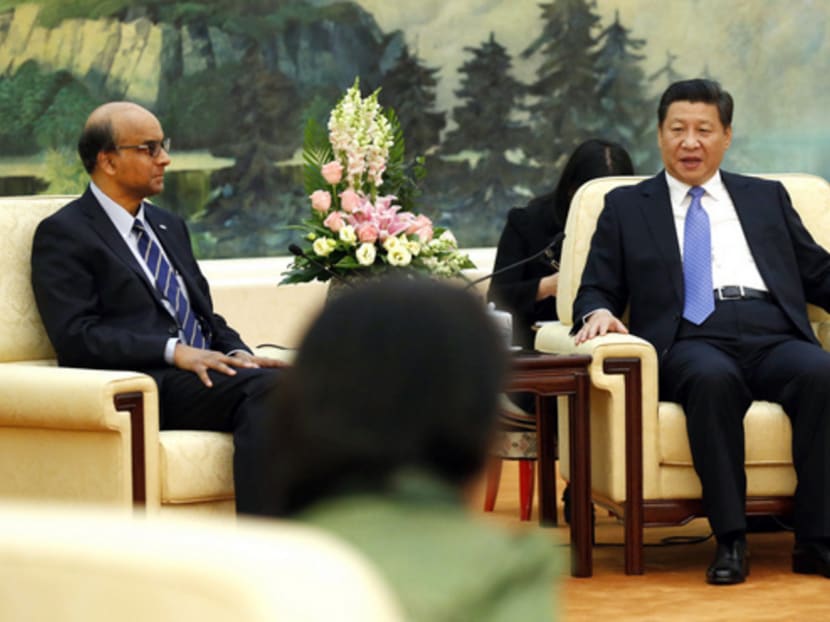S’pore should be AIIB’s regional headquarters
The China-led Asian Infrastructure Investment Bank (AIIB) has been drawing global attention, and most Asian countries and major powers outside Asia have applied to join.

China's President Xi Jinping (R) meets with the guests at the Asian Infrastructure Investment Bank launch ceremony at the Great Hall of the People in Beijing October 24, 2014. On the left is Singapore's Deputy Prime Minister and Finance Minister Tharman Shanmugaratnam. REUTERS/Takaki Yajima/Pool (CHINA - Tags: BUSINESS POLITICS)
The China-led Asian Infrastructure Investment Bank (AIIB) has been drawing global attention, and most Asian countries and major powers outside Asia have applied to join.
Japan and the United States are exceptions, largely because the bank is viewed as a rival for the US-dominated World Bank and the Japan-dominated Asian Development Bank.
The AIIB is expected to be established formally by the end of the year, with final negotiations on the establishment details to be undertaken intensively among the founding members (“Japan may join China-led bank with S$2b contribution”; April 9).
The AIIB’s headquarters will definitely be in Beijing, though Indonesia has recommended Jakarta as an alternative.
As one of the first 21 founding members, Singapore should take this opportunity to maximise its future influence in the bank, by lobbying to be the bank’s regional headquarters in South-east Asia.
The US$50 billion (S$68.3 billion)AIIB is designed to be a multilateral development bank, focusing on providing finance to infrastructure projects in Asia. Considering the bank’s nature and mission, Singapore has several advantages to becoming a regional headquarters for the AIIB.
First, Singapore is the fourth-most competitive financial centre and the top offshore yuan clearing centre in the world. Its least corrupt business environment, comprehensive financial markets and expertise, as well as large number of bilingual financial talents would be valuable to the AIIB’s success and reputation.
Second, to be a successful multilateral bank, the AIIB must recruit many international professionals, but it will be challenging for Beijing, due to its air pollution, to attract and retain them. Singapore, a garden city, can be an alternative workplace for these top talents.
Third, Singapore has been promoting the AIIB’s set-up since the beginning, and China values Singapore’s role in building the bank.
This might be why Deputy Prime Minister and Finance Minister Tharman Shanmugaratnam was chosen to lead representatives who met Chinese President Xi Jinping after signing the memorandum of understanding on Oct 24 last year to establish the AIIB.
Singapore would surely be a good bridge for the bank to explore South-east Asian markets.
Notably, Hong Kong has expressed interest in playing a more important role in the AIIB, to boost its stature. As a special administrative region of China and a renowned financial hub, Hong Kong is in a better position to become the bank’s regional headquarters.
However, its ongoing political conflict with the Chinese central government over universal suffrage has made the city less favourable. Thus, Singapore should not miss the chance to promote its value more aggressively within the AIIB’s future framework.
China’s rise has been an inevitable trend. To enhance its traditionally close ties with Beijing and better ride on China’s One Belt, One Road development strategy, Singapore should strive to become the AIIB’s regional headquarters, the sooner the better.









